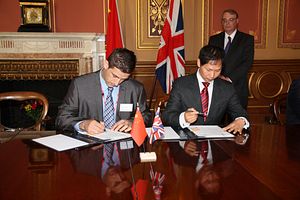Chinese President Xi Jinping arrives in the United Kingdom Monday, making him the first Chinese president in 10 years to visit the country. It’s yet another sign of deepening China-U.K. ties over the past few years – an abrupt turnaround from the deep freeze in the relationship that ensued after Prime Minster David Cameron met with the Dalai Lama in 2012.
The ice in China-U.K. relations was officially broken in December 2013, when Cameron visited Beijing. While he was there, the two countries sealed roughly 6 billion pounds ($9 billion) worth of deals. That was followed by up a visit to London by Chinese Premier Li Keqiang in 2014, resulting in another $30 billion in trade deals.
It’s no secret that trade is at the forefront of China-U.K. relations. In a press briefing on Xi’s trip, Chinese Vice Foreign Minister Wang Chao highlighted the two countries’ “extensive cooperation in such fields as trade, investment, finance, culture and personnel exchanges.” Just a month before Xi’s trip, the U.K. sent its chancellor, George Osborne, to China to boost economic cooperation. Osborne told reporters that “Britain should run towards China.”
“We should be doing more business with China. We should be better connected to the Chinese economy. Our financial institutions should establish proper links,” Osborne said. “[…]Our message to China is very clear: we want the U.K. to be China’s best partner in the west.”
The U.K. may already be China’s “best partner in the west.” In 2013, London became the first G7 country to create a currency swap line with China. This year, the U.K. was the first Western country to join China’s Asian Infrastructure Investment Bank (though it was followed in short order by much of western Europe, including France, Germany, Italy, and Spain). And this week, the U.K. is expected to officially give China its first shot at providing nuclear power to a Western country (more on that later).
At a time when other Western states – especially the United States – are expressing concerns about China’s assertiveness and questioning its respect for international law and human rights, the U.K. is taking the opposite tack. That decision is not without its critics; British media has been vocal about questioning the wisdom (and morality) of such an enthusiastic embrace of Beijing. Still, Cameron’s government seems unconcerned with the backlash and expects a “golden decade” in China-U.K. relations. Xi himself praised London’s “visionary and strategic choice” to be the “Western country that is most open to China” in a written interview with Reuters.
So what should we expect from Xi’s visit this week? The big announcement is expected to confirm Chinese investment in the Hinkley Point C nuclear power project – a $25 billion project that will see Electricite de France SA, with investment from China National Nuclear Corporation and China General Nuclear Power Group, construct the U.K.’s first new nuclear plant in 30 years.
China may also invest in a high-speed railway connecting London to Birmingham and cities farther north. Chinese Assistant Commerce Minister Zhang Ji told reporters that China and the U.K. should “push in-depth development of two-way investment cooperation by starting from high speed rail and nuclear power projects,” a strong hint that deals will be signed in those two areas.
On the financial front, there’s likely to be another major step forward. According to the Financial Times, London is pegged to become the first foreign financial center that can trade Chinese sovereign debt. “The plan is to issue Chinese Treasury bonds in renminbi in London after laying the foundations with launches of short-term debt by the People’s Bank of China, the central bank,” unnamed officials told Financial Times.
There are also signs that China would like to move beyond economics to expand political cooperation as well. Vice Foreign Minister Wang spoke not only of economic ties, but of China and Britain’s “long-term and sound communication in international and regional affairs.” He cited their cooperation on “the Iranian, South Sudanese and other issues” as well as their coordination in fighting the Ebola epidemic as examples. “During the visit, President Xi Jinping will exchange candid and in-depth views with the U.K. leaders on bilateral relations and international and regional issues of common concern to enhance understanding, expand consensus and blueprint the future development of bilateral relations,” Wang said.
Given London’s approach toward China, Beijing has hopes that it can gain a foothold in the West, particularly the EU, by expanding cooperation with the U.K. – not only on economic issues (such as the holy grail of a China-EU free trade agreement) but politically and diplomatically as well. That will be a harder sell for Xi, but Cameron may find that offering more diplomatic support for China is the ultimate cost of doing business with Beijing.
































